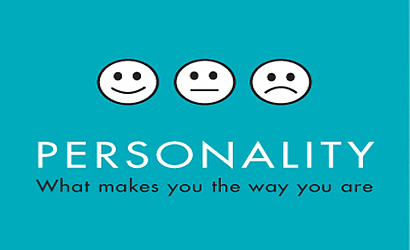
When you think of Peter in the Bible, how would you describe his personality? How about Paul? What kind of person was King Saul (the guy who hid back in the baggage when they were looking for him among the crowd: I Samuel 10)? If you met Gideon, how would you describe him as well (the guy who was hiding while working on the crops and said he was lowest “on the totem pole” in his father’s house: Judges 6)? Does what the Bible says about these people portray a certain personality in your mind? As we ponder these questions, consider, however, some biblical thoughts that I hope will help us to think well in this area of personality traits and personality types.
First: Think about the original creation with me from Genesis 1-2. How did God create us? Man was made in the image of God. Image means likeness. By the truth of creation in His image, we understand that humans are different from all other creatures. They were created with certain distinct qualities. These qualities make them a person, like God, as opposed to a creature like your dog or cat.
· Men and women have intellect: the ability to reason. They can arrive at conclusions and solve certain problems. By analysis and reason, they can figure things out.
· Men and women have a moral sense of right and wrong. Animals do not. Animals act out of God’s inner instinct as He created them. Humans are able to discern the difference between right and wrong, good and evil.
· Men and women have purpose and will: created to live and to work and to serve God in His kingdom. Animals respond out of obedience to the Creator. They do not choose to obey or disobey God.
· Men and women were made to worship the Creator. This union is a joyful relationship. Knowing God. We were made to love Him. Although animals respond to God as Creator, they do so out of innate creative obedience. Men and women choose to worship God.
· Men and women were made as social beings like God (God is his own “small group.” He enjoys being one or united. The Father and the Son and the Spirit are all joined in person, purpose, and priority. God is not a loner as a leader in the universe.) Community. Family. We enjoy that sense of being a part of a group. God made us this way.
Second: What happened to the creation at the fall? All of these areas of likeness to God were affected by sin and its decay. Sin is a negative and destructive force that leads to death, including its effect on the physical body. Our person, each one of us, has been affected and changed from God’s original creative purpose.
Examples:
· Intellect: Men and women became the center of their own thinking. They blame others. They view other people as a problem. They think they can do better for themselves than that what God can do for them. They, at times, can think very irrational thoughts and very foolish ideas.
· Moral: Men and women tend to rationalize and to relativize behavior based on a “gray” scale of right/wrong which is driven by what is best for themselves rather than what God desires. Conscience is skewed and can be adjusted by self-standards.
· Purpose: Men and women live for self and/or what they feel is best. What they desire is what they believe they need and therefore must have. They willfully choose and desire things that God says are not to be desired. Sin. Originally, Adam and Eve were wise in their choices. Then, humans became fools who chose foolishly to do their own will.
· Worship: Men and women worship self rather than the creator (Rom. 1). The things that they covet, these become their gods that they believe will bring them comfort and joy and pleasure rather than God. What sadness that people turned from loving and serving the highest being in the universe to worship anything that they see or know besides the true God.
· Social: There is disharmony (rather than being peacemakers). Men and women hurt others. They distrust others, including God. They believe and trust only self. They react and attack. They withdraw from community and interaction. They hide behind a mask, a job, or a fence.
Third: How does personality fit into this picture? Assess these labels by God’s standard.
· The Four Personality Theory (descriptions from Wikipedia)
- Sanguine personalities are impulsive and tend to seek out pleasure and social events. People with this personality type can be forgetful and have difficulty finishing tasks
- Choleric personalities tend to be leaders and are passionate. One negative quality is a tendency for sudden depression and mood swings.
- Melancholic personalities are independent and thoughtful, but they may dwell on the negative aspects of the world around them.
- Phlegmatic personalities tend towards being relaxed and showing affection. They also can be lazy or passive-aggressive when dealing with issues.
My response: No one tends to be an exact fit within these categories. But that discussion is not our main focus. After all, these categories are based only on observation. These categories do not tell us the WHY. And that question is critical to understanding people. If the four-personality-view of people is by God’s design, then we should accept the categories as sufficient help in understanding people. But the problem is that we find people accepting these personality labels while dismissing their sinful behaviors and sinful actions based on something they cannot change, personality.
Illustration: A woman in the church who has five boys screams at them because her personality doesn’t work well with all their wild behavior. So she excuses her anger and attacking words to her boys because of her personality.
My suggestion based on God’s commands and the above theology (Genesis and Romans) is that we must never excuse disobedience to God under the guise of personality: “I yell at my kids because I’m sanguine.” “I don’t clean the house because I am melancholy.” Therefore, we should call one another to change. Change what you call your personality. Become like Christ. In fact, we get into big trouble when we look at everyone else and think we should be like them. Whoever it is that you want to be like, they themselves are not the full image and likeness of God in their own personality.
Illustration: Someone claims to be melancholic. So when you point out the passages and verses on joy and hope in God, they respond by saying, “I’m just not a chipper kind of person. I’m low in emotion. I don’t get excited about stuff.” Okay. So we can just ignore these verses on joy and hope in God? Is it then okay to be gloomy in God? Paul had times that he was discouraged, but he was the one who called on us to rejoice. And he did so while in prison for Christ and for the gospel (check out the book of Philippians).
Someone else says, “I am just not the outgoing kind of person who can walk into a room and start talking to people. I mess it up. I am much better behind the scenes. Way behind the scenes. I do well on my own. I can spend hours away from people and that is fine with me. People are not enjoyable to be with anyway. I would rather be with my dogs hunting than hanging out and talking with people.” Yup. And so that kind of person is allowing the effects of the fall to drive his or her lifestyle and choices and ignore the demands and commands of God through the New Testament that are centered on community and family and doing the “one anothering” commands of Christ.
· The Two Personality Type Theory (descriptions from Wikipedia)
Type A individuals are described as outgoing, ambitious, rigidly organized, highly status-conscious, sensitive, impatient, anxious, proactive, and concerned with time management. People with Type A personalities are often high-achieving “workaholics.” They push themselves with deadlines and hate both delays and ambivalence.
Type B individuals, by definition, are noted to live at lower stress levels. They typically work steadily, and may enjoy achievement, although they have a greater tendency to disregard physical or mental stress when they do not achieve. When faced with competition, they may focus less on winning or losing than their Type A counterparts, and more on enjoying the game regardless of winning or losing. Unlike the Type A personality’s rhythm of multi-tasked careers, Type B individuals are sometimes attracted to careers of creativity: writer, counselor, therapist, or actor. However, network and computer systems managers, professors, and judges are more likely to be Type B individuals as well. Their personal character may enjoy exploring ideas and concepts. They are often reflective, and think of the “outer and inner world.”
My response: Whichever end of the spectrum you happen to be on, you need to come to the middle where Christ is. He worked on this earth very diligently, but he did not ignore people. He did not destroy relationships because he was “driven” by the ideals of His Father’s kingdom. He instead was driven to draw people into the kingdom or warn them about rejecting it. He also met the needs of crowds, being compassionate towards others, not hiding away in an apartment. He could connect with one needy woman in the midst of the multitude while heading to care for a young girl on her deathbed who was all alone. In contrast, Jesus also did not just sit around shooting the breeze with the disciples all day while talking about how nice it will be to see the kingdom come. He did not hide out from the multitudes (on the mountain praying with His Father) and ignore the problems of the masses. When it was day and the responsibilities were evident, Jesus stepped up and got to work.
In conclusion, while the labels help us to identify simple variance in the definition of personality, that’s fine. The goal of personality categorization may help us to identify our weaknesses and strengths, but the question is “What will we do with the assessment?” Will we hide behind our label, or will we pursue Christ-likeness where there are no weaknesses?

” Oh to be like thee… ” Wm James Kirkpatrick